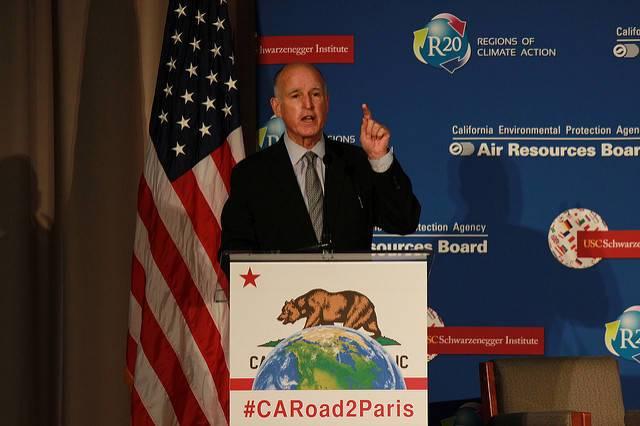
President Donald Trump's bombshell announcement on June 2 from the White House rose garden couldn't have been better timed. The world was waiting and he had a message for global leaders: The U.S. wouldn't be coerced into supporting a global accord it didn't support.
"We're getting out," he announced defiantly. "I was elected by the citizens of Pittsburgh. Not Paris."
Well, the city of Pittsburgh has news for Trump: It's still in the Paris Climate Agreement.
In fact, so are more than 120 other cities and counties that this week joined a growing coalition of voices to say that the federal government's position on climate and carbon emissions won't be enforced inside their city limits. So far, 12 states -- including Pennsylvania -- signed a letter to tell Trump that "we are still in" Paris and don't intend to back down from their efforts to reduce carbon emissions.
They have also criticized the Trump administration's position, saying that it "undermines a key pillar in the fight against climate change [and a move which is] out of step with what is happening in the United States." States, cities and other regional governments intend to march on in support of Paris.
"California will do everything it can to not only stay the course, but to build more support — in other states, in other provinces, in other countries," California Governor Jerry Brown told the Los Angeles Times. " Brown has been an outspoken critic of the Trump administration's policies on environment.
So has Connecticut Governor Dan Malloy, who has sparred with Trump on several occasions regarding federal immigration policies. His criticism of the president's failure to keep the U.S. at Paris echoed a growing sense of unity among businesses and non governmental organizations that see no choice but to stay in the accord, but were hoping for federal leadership in the process.
"For our part, in Connecticut we will continue building on our efforts to address climate change with common sense, practical initiatives that will help to build and grow our economy. Unfortunately, we lack a strong partner at the federal level as we go about this incredibly important work." said Malloy in a statement.
So far more than 900 businesses and investors and 180 educational institutions across the nation have signed a letter to the international community vowing to stand behind the Paris agreement and to continue to work to reduce carbon emissions. The list includes 20 Fortune 500 companies, including some of the biggest names in the tech industry. Apple, Microsoft and Adobe have signed on, as have Mars, Inc., Bloomberg, LP, Ben & Jerry's, Patagonia and The North Face. Investors include a variety of asset management companies and NGOs, including the Sisters of St. Joseph and The California Public Employees' Retirement System.
"In the U.S., it is local and state governments, along with businesses, that are primarily responsible for the dramatic decrease in greenhouse gas emissions in recent years. Actions by each group will multiply and accelerate in the years ahead, no matter what policies Washington may adopt," the letter states.
It's unclear if Donald Trump simply miscalculated the lack of support his announcement would receive, but there have been plenty of takeaways to note from this latest outcry.
First, public discord with Trump policies is becoming more common, creating an odd consensus among Democrat and Republican leaders that stopping climate change is critical.
Second, his decision to pull the country out of Paris may have done exactly the opposite of what Trump had hoped: Rather than lending weight to the argument that global warming is unproven, he has has galvanized vocal support for climate change. Both Democrats and Republicans have expressed concern with his environmental policies. In what seems like an unusually bold move by Montana's Governor Steve Bullock, it's forced leaders that represent a fairly conservative rural constituency to declare unilateral support for climate action.
"Ask any Montana farmer, rancher, hunter, angler, or skier – climate change is real and poses a threat to our economy and way of life. To not acknowledge that or deal with it in a responsible way is short-sighted and dangerous," said Bullock, a Democrat, who won his gubernatorial seat in 2016 by just 4 points over his Republican contestant.
And third, regional governments and businesses are now acutely aware that their support of Paris policies is only part of what it will take to address global warming.
As Brown noted, ""The complexity and scope of climate issues calls out for federal leadership and federal rules and laws." An absence of federal support may hurt efforts to increase jobs needed in the green sector.
As is so often his approach, Trump did leave a back door open to returning to the Paris agreement by suggesting that he would be willing to "negotiate" the terms of U.S. participation in the future. It's unclear however, whether European nations will be just as willing. Like America's many independent businesses and regional governments, European states are determined to meet Paris goals -- with or without more time-consuming meetings with Washington.
Flickr image: California Air Resource Board
Jan Lee is a former news editor and award-winning editorial writer whose non-fiction and fiction have been published in the U.S., Canada, Mexico, the U.K. and Australia. Her articles and posts can be found on TriplePundit, JustMeans, and her blog, The Multicultural Jew, as well as other publications. She currently splits her residence between the city of Vancouver, British Columbia and the rural farmlands of Idaho.














